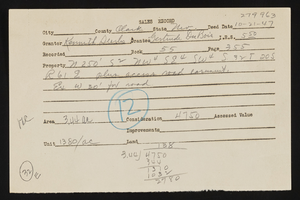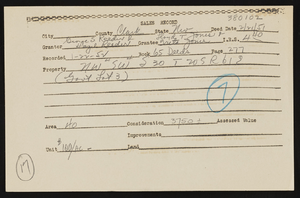Search the Special Collections and Archives Portal
Search Results
March, Debra, 1953-
Debra March was born November 25, 1953 in Detroit, Michigan. She is one of eight siblings, all of whom attended Catholic school as children and eventually went on to professional careers. March’s father worked for the city of Detroit, then moved to Las Vegas, Nevada and was hired by the Clark County School District. March came to Las Vegas for the first time in 1973. Though she left for a couple of years, she eventually settled there and attended the University of Nevada Las Vegas (UNLV), earning an undergraduate degree in anthropology and biology.
Person
Williams, Amie S.
Amie Williams "is an award winning producer/director specializing in documentary film and video for television, NGO’s and political campaigns. Her films, such as We Are Wisconsin, No Sweat and Uncommon Ground have won numerous awards, including the John D. and Catherine T. MacArthur Foundation Peace Grant, the International Documentary David Wolper Award, a NEA Media Grant, and the SONY/Streisand Award for emerging female filmmakers. Amie’s work has appeared on the Discovery Channel, PBS, BBC, Current TV, Al Jazeera English and Kenya Television Nation.
Person
Broudy, Pat, 1923-2017
Radiation survivors advocate "Pat" Broudy was born Alice Patricia Sutton in Overland, Kansas in 1923 at the home of her grandparents. She spent her formative years in Kansas City, Missouri. In 1948, she ventured with friends to San Francisco, California where she met Marine Major Charles A. Broudy. Major Broudy was attending radiological school there. After a whirlwind courtship they were married in 1949. Major Broudy had already served in WWII as a pilot in the Pacific theater.
Person







